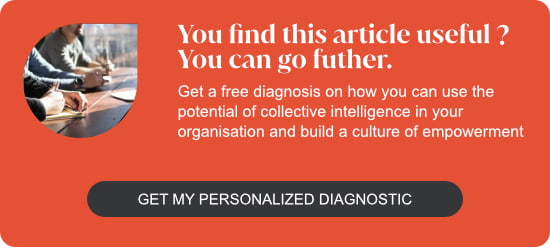The answer: mobilize collective intelligence
Knowing how to listen means possessing, in addition to your own, the brains of others. Leonardo da Vinci
In the case of a quantifiable problem, such as predicting the weight of an ox, we can collect the subjective perception of each person by asking them to bet, and then we can aggregate the points of view, i.e. cancel out the bias, by calculating the median.
But how do we do this in the case of a non-quantifiable problem? How do we collect the subjective points of view of each person? How to calculate the median of an idea?
All collective intelligence processes, based on divergence, emergence and convergence, allow us to bring this equation to life….
Divergence, or the collection of points of view
Each person is invited to connect to his or her own cognitive bias and then to express his or her subjective perception, HIS or her answer, not THE answer. We do not seek to know who has the best answer in the group but we seek to have everyone be completely themselves, to the point of their imperfections.
This moment of divergence is only interesting if the people gathered are both concerned by the problem, i.e. they have a point of view on the subject, and that these points of view are different. If everyone has the same cognitive bias, if the group is monolithic, from the same life history, the subjective perceptions will be very similar. The cognitive biases will then add up instead of canceling each other out.
This moment of divergence is absolutely critical. Without independence of thought, without the possibility of expressing different points of view, the crowd becomes stupid. Only the expression of the subjectivity of each person makes the crowd intelligent. All the dictatorships we have observed throughout history have in common the single thought, with the obligation for the crowd to think as one. Their danger is no longer to be demonstrated.
Emergence then convergence, or the aggregation of points of view
This phase consists in calculating the median of a non-quantifiable idea! How to translate mathematics into humanities?
The translation of the median is called generative listening. This phase consists of each person listening to the others with the intention of being transformed by their different points of view.
This is a delicate moment. Opposing points of view should not clash but mingle, fertilizing each other to create something new, unlike a political debate, where each person tries to prove that they are right. In complexity, we seek to listen fully to the other while expressing our own point of view. We are neither above nor below, we need to be in parity.
The practice of the circle and all its variations are appropriate. This exercise is demanding.
- Everyone is invited to speak with intention, to put forward their point of view even if it is different from that of the majority.
- Speaking time must be shared equally so as not to overweight or underweight a point of view.
- The quality of presence must be at its maximum: the head, the heart and the body are invited to be in the same place and to communicate with each other.
- Opposing points of view are welcomed and can coexist without being resolved.
Convergence, or the arrival of stabilization
Eventually, the ‘magic’ happens. The conversation eventually stabilizes, at a place that corresponds to the median! A human mechanism has occurred, which is the integration of ideas by creative resources. This moment is often felt kinesthetically and emotionally, tensions are lifted, the system is stabilized
To make decisions in a complex environment, we must allow the diversity of perceptions to express themselves and then allow each person to be transformed by the points of view of others.
Including diversity is the only way to create value in our current world. This is neither morality nor normative ideology, it is mathematics!
If you are interested in this topic, if this post challenges you, I will be happy to read your comments and respond. We can also discuss it with pleasure. Write me an email: chloe.grabli@fabric.team

I am contributing to generate a future of work desirable for people, organisations and society. I include diversity and connect polarities that are too often split apart : science & humanity, freedom & constrains, profit & ethics, local & global, preservation & creativity, digital & human.
Chloé Grabli
Partner
Learn more on Linkedin

